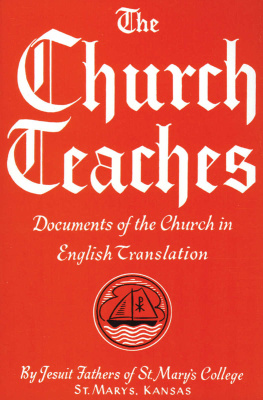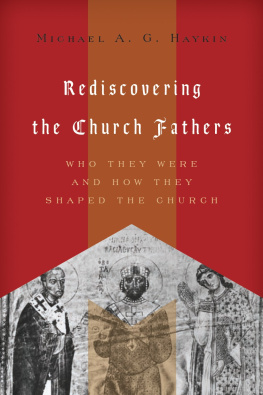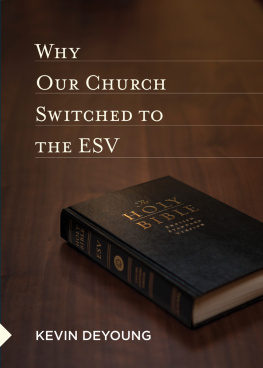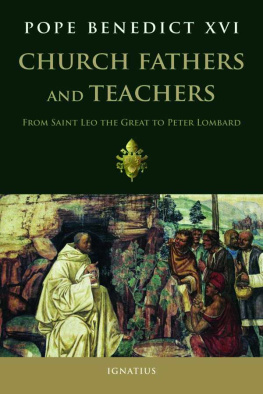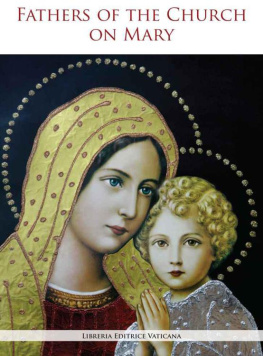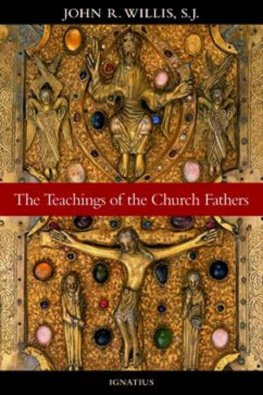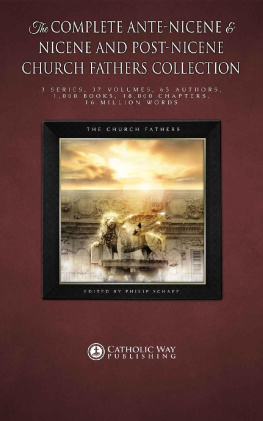Jesuit Fathers of St. Marys College - The Church Teaches: Documents of the Church in English Translation
Here you can read online Jesuit Fathers of St. Marys College - The Church Teaches: Documents of the Church in English Translation full text of the book (entire story) in english for free. Download pdf and epub, get meaning, cover and reviews about this ebook. year: 2015, publisher: TAN Books, genre: Religion. Description of the work, (preface) as well as reviews are available. Best literature library LitArk.com created for fans of good reading and offers a wide selection of genres:
Romance novel
Science fiction
Adventure
Detective
Science
History
Home and family
Prose
Art
Politics
Computer
Non-fiction
Religion
Business
Children
Humor
Choose a favorite category and find really read worthwhile books. Enjoy immersion in the world of imagination, feel the emotions of the characters or learn something new for yourself, make an fascinating discovery.
- Book:The Church Teaches: Documents of the Church in English Translation
- Author:
- Publisher:TAN Books
- Genre:
- Year:2015
- Rating:4 / 5
- Favourites:Add to favourites
- Your mark:
- 80
- 1
- 2
- 3
- 4
- 5
The Church Teaches: Documents of the Church in English Translation: summary, description and annotation
We offer to read an annotation, description, summary or preface (depends on what the author of the book "The Church Teaches: Documents of the Church in English Translation" wrote himself). If you haven't found the necessary information about the book — write in the comments, we will try to find it.
The Church Teaches: Documents of the Church in English Translation — read online for free the complete book (whole text) full work
Below is the text of the book, divided by pages. System saving the place of the last page read, allows you to conveniently read the book "The Church Teaches: Documents of the Church in English Translation" online for free, without having to search again every time where you left off. Put a bookmark, and you can go to the page where you finished reading at any time.
Font size:
Interval:
Bookmark:
The Church
Teaches
Documents of the
Church in English
Translation
St. Mary's College, St.
Marys, Kansas
IMPRIMI POTEST:
Daniel H. Conway, S.J. Provincial, Missouri ProvinceNIHIL OBSTAT:
Malachi J. Donnelly, S.J. Censor DeputatusIMPRIMATUR :
Edward J. Hunkeler, D.D. Archbishop of Kansas City in Kansas April 20, 1955Copyright 1955 by B. Herder Book Co.
Copyright 1973 by TAN Books
Originally published by B. Herder Book Co.
TAN Books
Charlotte, North Carolina
www.TANBooks.com
1973
THE REV. GERALD VAN ACKEREN, S.J.,
conceived the idea for this book and interested the collaborators in the work. Translated and prepared for publication with his continued encouragement and counsel, it is now published with his approval. Any future editions will be prepared at his discretion.
Rerum Christianarum Antiquarum Studiosissimo
Filio Ignati Insigni
Sacerdoti Patientissimo
Augustino C. Wand, S.J.
Scriptores
Dant Donant Dicant
Preface
In recent years new emphasis has been placed on the religion courses in our Catholic colleges and universities. Programs in religion departments have been reorganized and in some places courses in theology have been introduced in an effort to equip the student with a more adequate knowledge and appreciation of the reasonableness, unity, and beauty of his Catholic faith as well as its all-pervading influence in a fully human and fully Christian life.
In developing suitable programs for the intellectual religious training of students engaged in higher education, one of the main problems is the preparation of adequate handbooks for the students. Some new textbooks have already begun to appear, but as yet none has found anything like whole-hearted acceptance. Such textbooks are usually based on different conceptions of the objectives in religious intellectual training at this level of education.
In any course on the college level, however, the teacher must at least begin to acquaint his students with the fundamental sources of his knowledge. In the study of theology the primary sources are the Scriptures and tradition. But as our Holy Father Pius XII in the encyclical Humani generis reminds us:
... Together with the sources of positive theology [ Scripture and tradition ] God has given to his Church a living teaching authority to elucidate and explain what is contained only obscurely and implicitly in the deposit of faith. The authentic interpretation of this deposit of faith has been entrusted by our divine Redeemer not to the individual members of the faithful, nor even to theologians, but solely to the teaching authority of the Church. If then the Church exercises this authority, as she has done frequently in the course of the centuries, either in the ordinary or extraordinary way, it is obvious how false that method is which would explain what is clear by what is obscure. Indeed, the opposite procedure must be used. Hence, our predecessor of immortal memory, Pius X, when teaching that the most noble function of theology is to show how doctrine defined by the Church is contained in the sources of revelation, with very good reason added these words: "in the sense in which it has been defined by the Church."It is clear, then, that the ultimate and infallible criterion given to man for the interpretation and understanding of God's revelation is the teaching authority of His Church. Apart from this infallible guide to the meaning of revelation, no sound theology can be developed.
The student of theology, therefore, must be given a first-hand acquaintance with the pronouncements of this teaching authority, if he is to take even the first steps in theological learning. However, all these documents were composed originally either in Latin or Greeklanguages difficult to learn and not easily mastered in a way which gives ready access to the treasures of knowledge which they contain. Even seminarians who have had several years of training in Latin still find the stately language of the Church difficult, and eagerly search for translations in their native tongue.
The urgent need for a collection of the more important of these documents in English translation was the reason for initiating the project which has now culminated in the publication of this volume. The translators invited to do the work are competent Latin and Greek scholars who have also manifested their proficiency in theological learning. Although the work has been checked and re-checked, we would be very grateful for any forthcoming suggestions for improving either the translations themselves or the selection of the documents used. Helped in this way, we hope eventually to provide a truly valuable vade mecum for the American student of theology.
G ERALD V AN A CKEREN, S.J.
Foreword
This book aims to present to the student of dogmatic theology a translation of some documents of the Church that are most frequently used and are most important for the ordinary courses of theology. In the first place a series of creeds is presented, for the creeds are usually quite general in their dogmatic content. The other documents follow, grouped according to treatises that are now commonly used in the presentation of dogmatic theology. Within each section chronological order is followed.
The introductions to the several divisions of the book and to individual selections do not at all pretend to supplant the work of the teacher in supplying the background necessary for the correct interpretation and evaluation of each document. They are merely intended as helps to give some preliminary orientation for the benefit of the teacher or student, and above all of those persons who may read this book without the guidance of a theologian. Even a competent Church historian or historian of dogma can welcome a handy framework of names and dates. The principal aim was to make the introductory remarks pertinent and accurate, but by no means exhaustive. Usually there is but one fairly complete introduction for each document; if selections from the same document appear elsewhere in the book, a cross reference is made to this principal introduction.
For the convenience of students, there is a topical index that indicates where important theses of each dogmatic treatise can be verified from the sources. There is also a list of the ecumenical councils of the Church with an indication of the main matter treated by each council. A table of reference to Denzinger's Enchiridion symbolorum (29th edition) is provided to enable the student to locate easily the English translation in this book corresponding to some of the documents presented in Denzinger. Likewise, the marginal numbers that identify selections in Denzinger's collection, are put in parentheses immediately under the marginal numbers of The Church Teaches , to facilitate reference to the Latin or Greek original in Denzinger.
Whenever this book presents the translation of a selection that also appears in Denzinger, the translation has been made from the text as given in Denzinger, unless something else is expressly noted. For the most part, the twenty-fourth edition of Denzinger was used; for more recent documents the enlarged twenty-eighth and twenty-ninth editions were followed.
It is important to notice that, unless some other indication is given, the translation always follows the Greek text when this is given in Denzinger. For translations that are not made from Denzinger, the source of the document is indicated each time the document is presented.
To avoid cumbersome and unnecessary footnotes, this book dispenses with identifying quotations and providing references given in the text of an ecclesiastical document. The reader desiring full information must consult the corresponding number of Denzinger or the source from which the translation has been made. However, references to Sacred Scripture, cross references to other selections in this book, and references to Denzinger are provided in parentheses in the text of the translation.
Next pageFont size:
Interval:
Bookmark:
Similar books «The Church Teaches: Documents of the Church in English Translation»
Look at similar books to The Church Teaches: Documents of the Church in English Translation. We have selected literature similar in name and meaning in the hope of providing readers with more options to find new, interesting, not yet read works.
Discussion, reviews of the book The Church Teaches: Documents of the Church in English Translation and just readers' own opinions. Leave your comments, write what you think about the work, its meaning or the main characters. Specify what exactly you liked and what you didn't like, and why you think so.

